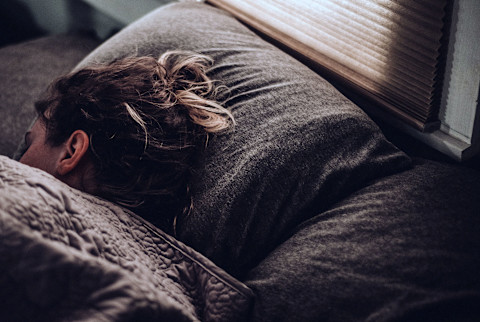Could Probiotics Help When Dealing With Chronic Sleep Loss? New Study Says Yes

Image by David Prado / Stocksy
May 14, 2023
By now we all understand the importance of getting a good night’s sleep, but whether you have a busy schedule, a new baby, or issues falling asleep and staying asleep, sometimes good sleep hygiene is more difficult to prioritize.
Chronic sleep loss (regularly getting only 4 to 7 hours of sleep in a night) comes with a plethora of undesirable effects, but according to new research published in the journal Nutrients1, there may be one thing you can do to mitigate those effects. Here’s what they found.
Advertisement
This ad is displayed using third party content and we do not control its accessibility features.
Studying how probiotics reduce the impact of chronic sleep loss
For this study, researchers wanted to look into how probiotics impacted the effects of chronic sleep loss. To do so, they split mice into two groups: ones that had a week of chronic sleep restriction, and ones that were sleeping normally, with half of the mice in each group getting a probiotic formula.
Based on analyzing protein, lipid, and DNA oxidation levels, along with gut-brain axis hormones and pro-inflammatory cytokines in the brain, the researchers observed that chronic sleep restriction not only caused oxidative stress, but also promoted inflammation and altered gut-brain axis hormones.
Interestingly enough, however, for the mice with chronic sleep loss who had been administered a probiotic formula, the researchers saw that the probiotic boosted antioxidant capacity in their brains, which helped to temper the aforementioned oxidative stress. “It positively regulated gut–brain axis hormones and reduced peripheral and brain inflammation induced by chronic sleep restriction,” the study authors added.
Of course, this study was done on mice, and we can’t definitely say if results could be replicated in humans. But the authors concluded that probiotic supplementation “could be a possible strategy to counteract oxidative stress and inflammation promoted by sleep loss.” And given the existing research, we know probiotics come with a slew of other benefits.
Advertisement
This ad is displayed using third party content and we do not control its accessibility features.
What to do about it
Of course, one of the best ways to mitigate the effects of chronic sleep loss is to, well, prioritize quality sleep. To that end, rules of thumb like going to bed and waking up at the same time every day, plus limiting caffeine late in the day, are important to follow.
If you’re not getting enough sleep on a regular basis, you may want to consider incorporating a research-backed sleep supplement into your routine with ingredients that are proven to help you fall asleep faster and stay asleep—like magnesium and pharmaGABA.
But again, sometimes life gets in the way and you have to deal with a period of chronic sleep loss (looking at you, new parents!), so if that’s the case, consider this another reason to take a quality probiotic supplement to help counteract the effects. Here are our top faves, in case you’re not sure where to start.
The takeaway
Probiotics are a great way to improve your digestion, boost the healthy bacteria in your gut, and so much more. And according to this study, if you’re feeling the effects of chronic sleep loss, they just might help with that too.








